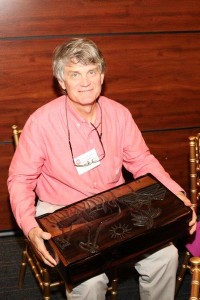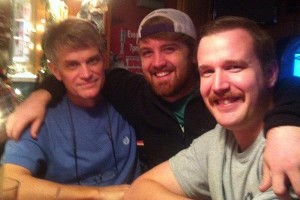
Chuck Jenkins holds a box he won in an auction at an Engineer without Borders banquet. The box contains items from their last trip to Togo, West Africa.
Like Charlie Brown in “Peanuts”, Charles (“Chuck”) Jenkins has never stopped attempting to be successful in what he does. The difference between the popular comic strip character and the Tupelo native is that the latter has become an undisputed champion in education, business, finance and family.
Jenkins’ journey to the winners’ circle began shortly before he decided to study engineering at the University of Mississippi.
“I graduated from West Point High School, within the shadow of Mississippi State,” Jenkins said. “Though I graduated summa cum laude with an ACT score of 33, I received a letter from MSU stating that they could not offer me any financial aid. Ole Miss bent over backward to help me secure funding for school. That made the choice pretty easy. It also helped that my father graduated from Ole Miss in 1956, though he never pressured me to attend Ole Miss.”
As an undergraduate, Jenkins’ favorite UM professors and their classes were Glenn Hopkins in calculus I, Karl Brenkert in transport phenomena, Sam DeLeeuw in statics, Tyrus McCarty in dynamics, K.P. George in soil mechanics, Jim Reidy in physics and George Everett in the University Scholars program. Years later, as a graduate student, he favored Greg Easson in geographical information systems, James Reid in advanced calculus, Bob Hackett in finite elements, Ken Stead in structures and all his professors in computer science.
“I loved them because they cared about their subjects (and many were quite passionate about their subject) and also because they cared a great deal about their students,” Jenkins said. “Their doors were always open, and I darkened them often. Many of them also displayed a lively sense of humor that helped get us through the dreary study hours and homework sessions.”
Jenkins earned a bachelor’s degree in geological engineering in 1981 and headed off to work for Mobil Oil in Ada, Oklahoma.
“The big oil companies in those days moved employees around pretty frequently—I lived in four different states in the first six years of my career—and I grew weary of the moving,” he said. “During the latter part of my time at Mobil, I was retrained as a programmer and analyst in a real–time data center. I quit Mobil in 1988 and began a career as a consultant programmer.”
He and his wife moved to Baton Rouge because they knew she could get work there in her hometown. Jenkins enrolled for a couple of years in a clinical psychology Ph.D. program at Louisiana State University while continuing his consulting work.
“I left the program early after deciding that the clinical application of psychology did not accord with my engineering approach to life,” he said. “In 1988, my wife and I found ourselves in Rockland, California, which was too far from home. We didn’t want to raise our family in Baton Rouge, so we moved to Oxford.”
Thinking he would have a hard time sustaining his oilfield consulting work in Oxford, Jenkins enrolled in UM’s graduate program in civil engineering and earned a Master’s degree in 1996.
In 2000, he accepted a position with ExxonMobil in Houston. “We lived there three years, but were never happy in the big city,” Jenkins said. “We returned to Oxford in 2003, where I resumed my consulting practice. I also accepted a position as an instructor in the Ole Miss computer and information science department.”
Jenkins taught many of the undergraduate classes, particularly CSCI 251, the programming class taken by most, if not all, undergraduate engineering students. He enrolled in the graduate program in computer science and finished another Master’s degree in 2005, all while continuing his consulting practice and teaching full-time.
“By 2008, I was struggling to keep all the plates spinning, so I resigned from the instructor position to concentrate on finishing my dissertation,” he said. “I earned my Ph.D. in 2000. Despite all my worries, I have seen my consulting business blossom over the years.”
Jenkins readily confesses that his Ole Miss engineering education contributed greatly to his career success.
“My education contributed to my success by providing not only a solid grounding in the fundamentals of engineering, but also a conviction that I could, by following the engineering method, solve problems not found in the text books,” Jenkins said. “It also convinced me of the need for lifelong learning that has helped me remain relevant after 34 years in industry. It taught me how to proceed in the face of incomplete knowledge.”
Among his many professional achievements and honors, Jenkins said his most personally fulfilling achievement is the trust and respect of his clients and colleagues.
“My clients have been unbelievably loyal to me, even throughout my present illness,” he said “They have held work for me until I was able to shoulder it. My second–most fulfilling achievement is hearing from a former student that I made a positive difference in his life.”
President (and sole employee) of Jenkins Consulting Services, he provides programming and analysis services to the oil and gas industry.
“Primarily, I create and maintain applications that improve the client’s ability to monitor and plan activity on oil and gas rigs and in production fields,” he said.
Jenkins has supported the School of Engineering almost since graduation out of profound gratitude for the doors that Ole Miss opened to him after a spotty secondary science education.
“Early on, I took advantage of Mobil’s matching gifts program. I joined the Woods Order in the late 1980s and later honored my parents with a membership,” he said. “I have supported the Woods Society since its inception, and I have donated separately to Engineers without Borders and to various student professional society chapters.”
He has taught a class as an adjunct professor, and has visited classes to offer his experience on various topics. Jenkins served on the Engineering Advisory Board for a few years.
“Chuck Jenkins is an exemplary member of the Woods Society,” said Kevin Gardner, development officer for the engineering school. “Excellence characterizes every aspect of his financial, physical and intellectual support of his alma mater.”
Stricken by advanced cancer, Jenkins is undergoing chemotherapy. His wife, Sherry, takes care of him—a full-time job—and serves on the board of directors for Doors of Hope, a ministry to homeless families in Lafayette County that she launched a few years ago.
“I used to play guitar until my chemo treatments left my fingertips numb,” Jenkins said. “I jogged until the cancer and chemo treatments deprived me of the strength and stamina. We have always been avid baseball fans, so we follow Ole Miss baseball, and I watch MLB games on television as I can. I also enjoy playing games and assembling puzzles with my wife.”
The couple is most proud of their two sons.
“My elder son CJ, (aka Shelby), graduated with degrees in civil engineering and in public policy leadership from Ole Miss in 2014,” Jenkins said. “CJ is in the Ph.D. program in civil engineering at Johns Hopkins University. My younger son, Luke, is a rising junior majoring in geological engineering and Journalism at Ole Miss.”
Other members of Jenkins’ family are also close. His parents, Robert and Pat, live in Tupelo. Brother Bobby, who earned a bachelor’s degree in civil engineering from Ole Miss, and his family live on the Lee and Pontotoc County lines. Bobby’s son, Nicholas, earned a degree in computer science from Ole Miss in May. A sister and her husband live in North Carolina.
And what advice might “Chuck” Jenkins have for fictional Charlie Brown and those who are struggling in life?
“Whatever you choose to pursue in life, give it your all, and be open to the possibilities that develop along the way,” Jenkins said. “Real success lies in the process and in the relationships you develop along the way.”
